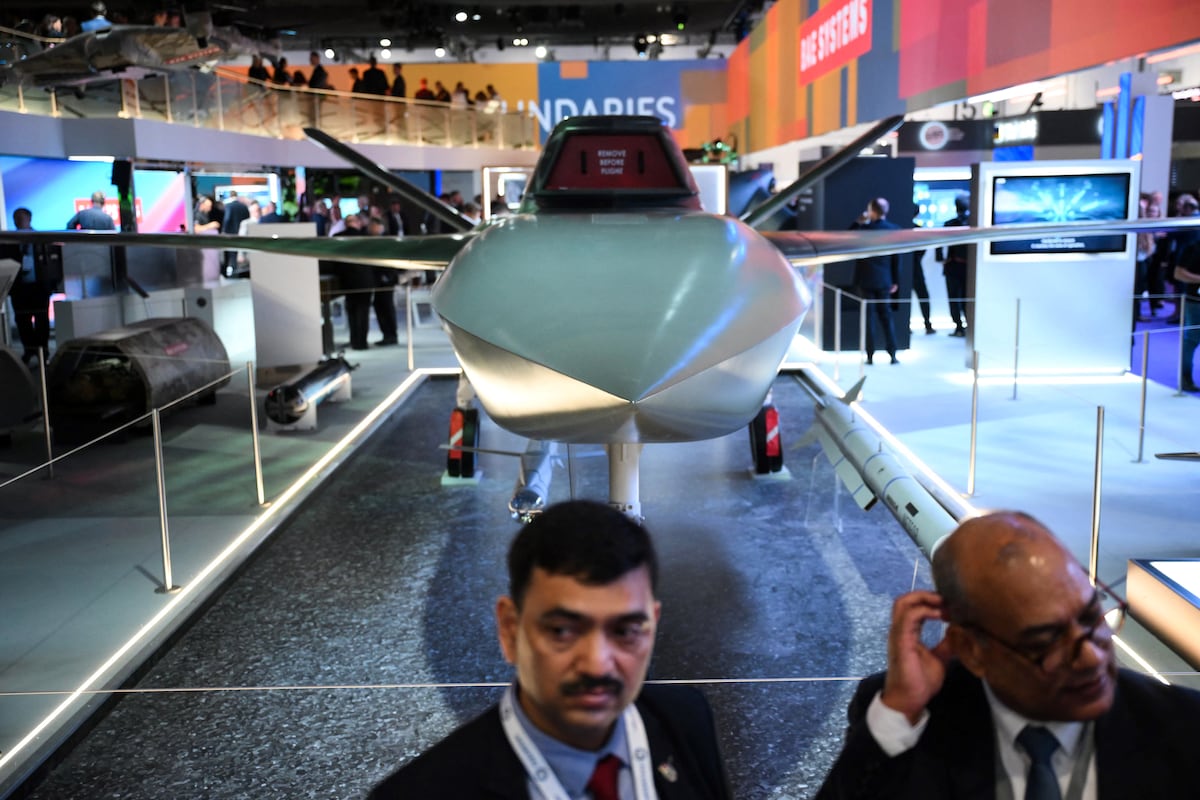



PARIS — As geopolitical tensions surge and drones and artificial intelligence continue to reshape warfare, the 2025 DSEI UK show in London is set to highlight the technological advancements that are transforming the battlefield.
This year’s show will focus on how countries such as the U.K. can make sure their armed forces are ready for the evolving nature of warfare, retired Air Vice-Marshal Gary Waterfall, the event’s senior military adviser, told Defense News.
Unconventional warfare has surged in the past year, from cyber and information warfare to the use of unmanned vehicles across air, land and sea, with a “dramatic uptick” in drone and counter-drone technology across all theaters, according to Waterfall, who helped develop the DSEI 2025 core theme of “Preparing the Future Force” in consultation with the U.K. Ministry of Defence.
“We’re in this midst of this technological revolution, and technologies are just rolling out at such a rapid pace, and it’s really important for all militaries to get to grips with it as soon as they can,” said Waterfall. “The real growth area is in the tech, and that tech will permeate throughout the show.”

This year’s edition of the show will feature an expanded tech zone, and organizer Clarion says DSEI UK 2025 will be the biggest yet, with 654 new exhibitors signed up and more than 45 countries represented. The four-day show will kick off on Tuesday, Sept. 9, with a greater presence from countries including Czechia and Lithuania, as well as more exhibitors from the United States and Canada.
The show’s focus on “future-proofing” the armed forces goes beyond just upgrading weapon systems to rethinking the entire defense ecosystem, from industrial production to military readiness, according to Waterfall.
“It’s much, much broader than thinking about the soldier, the sailor, the airman, and making sure they’re appropriately equipped,” Waterfall said. “It’s all well and good having the most effective military fighting force, but if your supply chain is wafer thin and you don’t have the resilience and that capability to sustain your military readiness, then you’re going nowhere quite quickly.”
The DSEI adviser highlighted the key role of small and medium-sized enterprises, with innovation often coming from smaller companies rather than big defense contractors. Waterfall cited Formula One industry spin-offs applying their AI and machine-learning skills to defense, and who will be among the exhibitor companies in the tech zone alongside the likes of Hadean and Palantir.
“Everyone would agree that the answer isn’t always provided by the prime contractor,” Waterfall said. “A lot of times it’s going to be the small, medium enterprises that have got the agility, from a financial and also people perspective, to rise to the challenge.”
The show’s sub themes of “Securing advantage,” “Driving advantage” and “Maintaining advantage” will each focus on a different aspect of defense readiness.
Securing advantage involves agile acquisition and supply-chain security, with Waterfall saying that even the most advanced military force would become ineffective without a resilient supply chain.
Driving advantage will look at the digital transformation of defense, with AI, cyber security and data analytics acting as force multipliers. Waterfall said the goal is not to replace human decision-making but to enhance it, and enable military leaders to make quicker, more informed decisions on the battlefield.
“We need to work quicker and act quicker than our potential adversaries. Which comes back to AI, machine learning, being able to decide and act quicker than those that you’re going up against,” Waterfall told Defense News.
Maintaining advantage will focus on the workforce challenge, with Waterfall saying the job market is competitive, not only in the U.K. but elsewhere, and attracting people to defense and security “might not be as straightforward as we would wish it to be.”
To address this, DSEI UK will dedicate its final day to engaging with the next generation of defense professionals. This will include university teams, industry apprenticeships, and military leaders discussing how to attract young talent to the defense sector.
Waterfall believes the workforce challenge may be just as critical as the technological advancements being showcased at DSEI, as defense experts will need to guide the development of AI and machine learning, and ensure that technology is deployed effectively.
“It’s the workforce challenge that’s probably a larger strategic problem than actually getting that defense industrial base strong enough.”
Rudy Ruitenberg is a Europe correspondent for Defense News. He started his career at Bloomberg News and has experience reporting on technology, commodity markets and politics.
